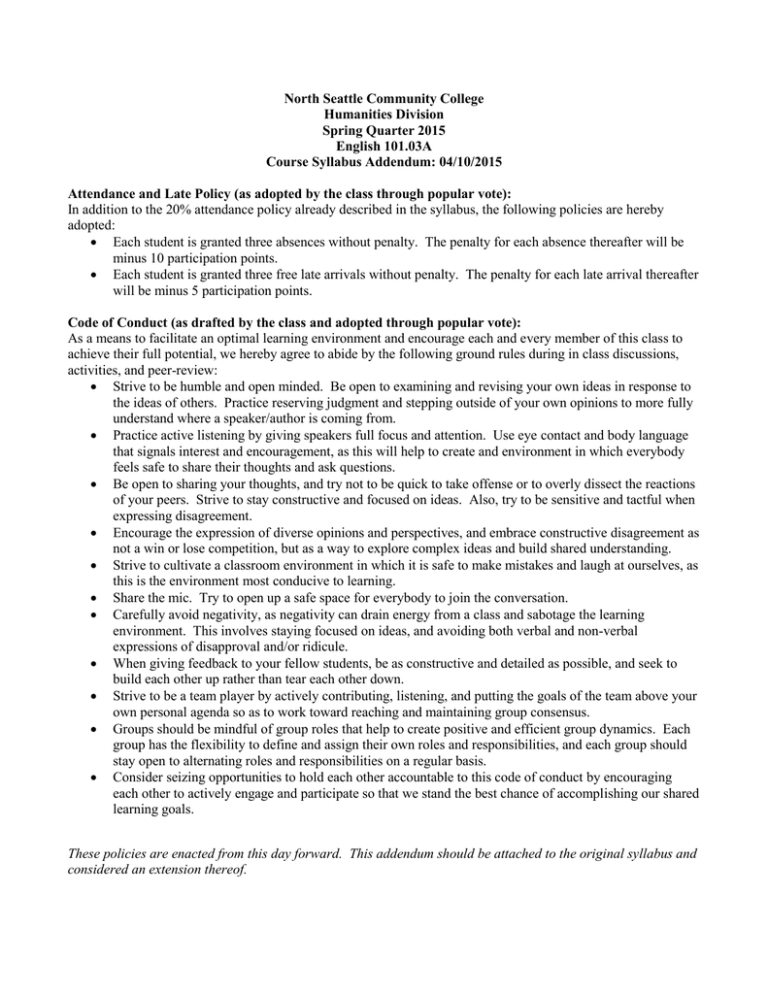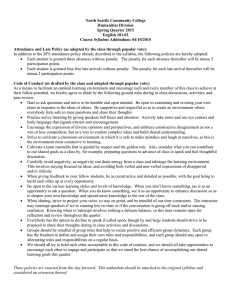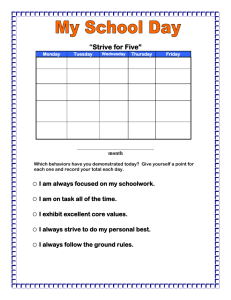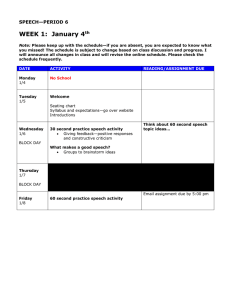North Seattle Community College Humanities Division Spring Quarter 2015 English 101.03A
advertisement

North Seattle Community College Humanities Division Spring Quarter 2015 English 101.03A Course Syllabus Addendum: 04/10/2015 Attendance and Late Policy (as adopted by the class through popular vote): In addition to the 20% attendance policy already described in the syllabus, the following policies are hereby adopted: Each student is granted three absences without penalty. The penalty for each absence thereafter will be minus 10 participation points. Each student is granted three free late arrivals without penalty. The penalty for each late arrival thereafter will be minus 5 participation points. Code of Conduct (as drafted by the class and adopted through popular vote): As a means to facilitate an optimal learning environment and encourage each and every member of this class to achieve their full potential, we hereby agree to abide by the following ground rules during in class discussions, activities, and peer-review: Strive to be humble and open minded. Be open to examining and revising your own ideas in response to the ideas of others. Practice reserving judgment and stepping outside of your own opinions to more fully understand where a speaker/author is coming from. Practice active listening by giving speakers full focus and attention. Use eye contact and body language that signals interest and encouragement, as this will help to create and environment in which everybody feels safe to share their thoughts and ask questions. Be open to sharing your thoughts, and try not to be quick to take offense or to overly dissect the reactions of your peers. Strive to stay constructive and focused on ideas. Also, try to be sensitive and tactful when expressing disagreement. Encourage the expression of diverse opinions and perspectives, and embrace constructive disagreement as not a win or lose competition, but as a way to explore complex ideas and build shared understanding. Strive to cultivate a classroom environment in which it is safe to make mistakes and laugh at ourselves, as this is the environment most conducive to learning. Share the mic. Try to open up a safe space for everybody to join the conversation. Carefully avoid negativity, as negativity can drain energy from a class and sabotage the learning environment. This involves staying focused on ideas, and avoiding both verbal and non-verbal expressions of disapproval and/or ridicule. When giving feedback to your fellow students, be as constructive and detailed as possible, and seek to build each other up rather than tear each other down. Strive to be a team player by actively contributing, listening, and putting the goals of the team above your own personal agenda so as to work toward reaching and maintaining group consensus. Groups should be mindful of group roles that help to create positive and efficient group dynamics. Each group has the flexibility to define and assign their own roles and responsibilities, and each group should stay open to alternating roles and responsibilities on a regular basis. Consider seizing opportunities to hold each other accountable to this code of conduct by encouraging each other to actively engage and participate so that we stand the best chance of accomplishing our shared learning goals. These policies are enacted from this day forward. This addendum should be attached to the original syllabus and considered an extension thereof.


